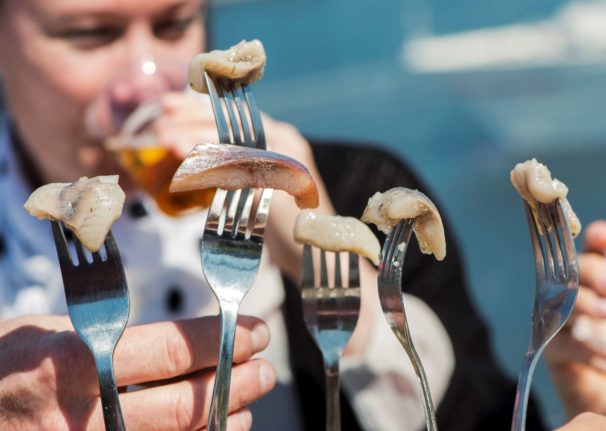Sweden’s festive feasts usually take the form of a buffet table; the julbord at Christmas, påskbord at Easter, and midsommarbord at Midsummer. Some recipes are seasonal, such as the abundance of eggs at Easter and strawberry cakes that take pride of place at the summer solstice, but there are also the usual suspects that crop up at each and every Swedish holiday.
Meatballs, prinskorvar (small sausages) and smoked salmon normally feature, but the real star of the show without which no buffet is complete is the pickled herring.
Herring are extremely plentiful in the North and Baltic Seas, so they have sustained generations of Swedes, even before Sweden was Sweden. The method of pickling the fish (first salting them, and then putting them in a mix of water, vinegar and seasoning) has been used since the Middle Ages, so that they could be preserved for storage and transported for trade purposes.
When we say seasoning, it could really be anything. Onion, mustard, garlic, and lingonberries are some of the most common flavourings, but every chef and amateur will have their own favoured recipe, and recent years have seen some more adventurous combinations such as apple and cinnamon herring saffron herring.
CHRISTMAS IN SWEDEN:
It’s the ubiquity of herring that made it a holiday staple, in contrast to the spices now associated with Christmas, which gained importance because of their scarcity that made them a treat reserved for holidays.
Since national holidays like Christmas and Midsummer are typically a chance to take a break from everyday life and find comfort in tradition, people tend to eat similar foods each year, so old-fashioned dishes like pickled herring remain firmly on the menu.
However, Sweden isn’t the only place where the fish is a festive must-have, as pickled herring is also among the 12 typical Christmas dishes eaten in Ukraine, Poland and Lithuania.



 Please whitelist us to continue reading.
Please whitelist us to continue reading.
Member comments